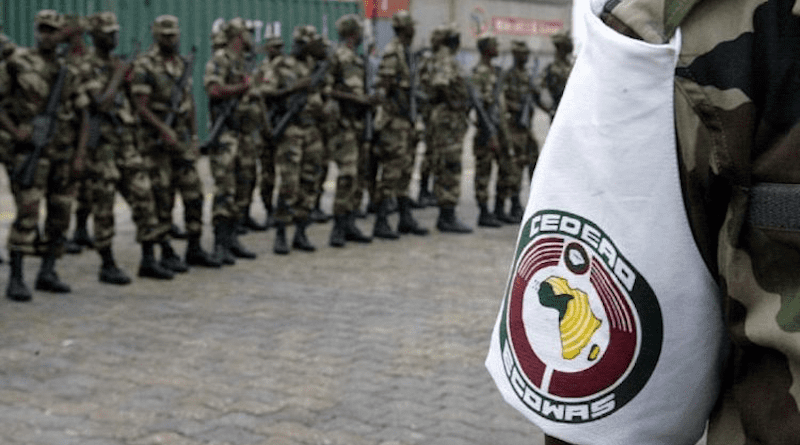African Troops Heading For Guinea Bissau After Failed Coup Linked To Narcos
By IDN
By Lisa Vives
ECOWAS, a West African trade union, has voted to send troops to the coastal nation of Guinea Bissau after unidentified coup plotters brazenly threatened the lives of government leaders.
While the identity of the coup plotters is still unknown, the nation’s president, Umaro Sissoco Embalo, a former general, linked the attack to the international drugs trade which has given the country the name “narco-state” by U.S. and UN officials.
According to local reports, President Embalo, 49, was ambushed on Tuesday, Feb. 1, by gunmen armed with machine guns and assault rifles. The heavily armed men surrounded government buildings in the capital city of Bissau where the President and Nuno Nabiam, his prime minister, was said to be attending a cabinet meeting.
During a five hour gunfight, at least 11 people were shot dead, it was reported, including military and paramilitary forces and four civilians.
Minister Fernando Vaz said the attempted coup was perpetrated by people with “ulterior motives” with the support of “people with financial capabilities.”
President Embalo called the attackers “well prepared and organized,” and said they could also be related to drug traffickers.
Sandwiched between Guinea to the south and Senegal to the north, Guinea-Bissau, with 88 islands, is a major transit point for Latin American cocaine headed for Europe, contributing to its perpetual instability.
With a population of about 2 million, the West African nation has a political history of nonstop coups or attempted coups since independence from Portugal was won in 1974 after a brutal war of 11 years. Only one democratically elected president completed a full term.
The drug trade caught the eye of the U.S. Drug Enforcement Agency in 2012 and in 2013, the former head of Guinea-Bissau’s navy, José Américo Bubo Na Tchuto, a veteran of his country’s war of liberation against Portugal from 1956-1973, was captured at sea in a sting operation by the United States Navy with support from Cape Verde.
Na Tchuto, the so-called kingpin of West Africa’s illicit drug trade, was arrested with six accomplices and tried by the New York District Court where he pleaded guilty to conspiring to import narcotics in the United State. His trial sparked nationalistic indignation in some circles. Since serving most of his four-year sentence, he could be released immediately, his lawyer said to Reuters.
In parallel with the Na Tchuto operation, the DEA nearly caught a bigger fish – Antonio Indjai, head of the Guinea-Bissau Armed Forces – who narrowly escaped a dragnet set up by U.S. agents posing as Colombian cocaine traffickers. Called “one of the most powerful destabilizing figures in Guinea-Bissau,” he stands accused of conspiring to sell surface-to-air missiles to the Revolutionary Armed Forces of Colombia (FARC), to protect cocaine processing operations and with conspiring to import drugs into the U.S.
Indjai evaded capture and now operates freely throughout West Africa, using illegal proceeds to corrupt and destabilize other foreign government and undermine the rule of law throughout the region, the State Dept. wrote on its reward poster.
“It’s a threat to our stability,” Bubacar Ture, vice president of the Guinean League for Human Rights, told a reporter for the New York Times. “Even out of the barracks, he can do damage. He is powerful. He is a rock in the government’s shoe.”
Yet much of the country’s military is believed to be loyal to Indjai who has men “all over the units,” according to an armed forces official who spoke with the Times on condition of anonymity.
Indjai is currently the target of a U.N. travel ban and the subject of a U.S. Narcotics Reward Program which has offered up to $5 million for information leading to arrest and/or conviction. Embalo reportedly has rejected the possibility of extradition, declaring that Guinea-Bissau will handle its own security issues and that Indjai can “move around as he pleases.”
“No Guinean citizen,” he said, “will be brought to justice in another country.”
The Economic Community of West African States suspended Burkina Faso, Guinea and Mali from the 15-member bloc and imposed sanctions on Guinea and Mali after military takeovers. The African Union also suspended the three countries.
Meanwhile, ECOWAS president Nana Akufo-Addo speaking at a recent ECOWAS Summit said the recent surge of coups – in Burkina Faso, Guinea, Mali and Guinea Bissau – is worrying and must be stopped. “Let us address this dangerous trend collectively and decisively,” he said, “before it devastates the whole region.”

